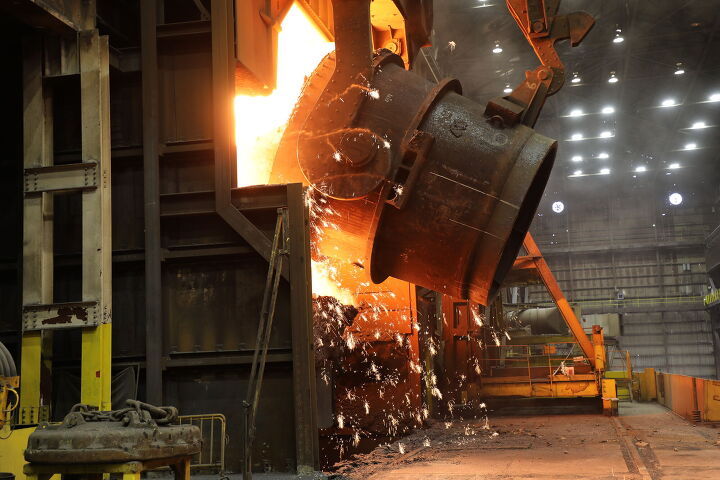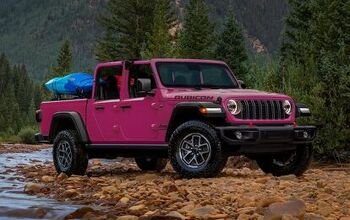Nippon Steel Set to Buy U.S. Steel, Union Dismayed

On Monday, Japan's Nippon Steel expressed its intention to purchase the United States Steel Corporation. The iconic American business supplies numerous industries, with the automotive sector being one of the largest.
Nippon Steel is reportedly offering a deal worth $14.9 billion and the assumption of any debt. However, the United Steel Workers don’t seem pleased with the arrangement and were said to have backed an earlier offer from domestic rival Cleveland-Cliffs Inc. totaling $7.25 billion.
The Cliffs deal fell through by August of 2023, at which time U.S. Steel started mulling over larger offers from Japan.
"We remained open throughout this process to working with US Steel to keep this iconic American company domestically owned and operated, but instead it chose to push aside the concerns of its dedicated workforce and sell to a foreign-owned company," said United Steelworkers president David McCall.
"To say we're disappointed in the announced deal between US Steel and Nippon is an understatement, as it demonstrates the same greedy, shortsighted attitude that has guided US Steel for far too long.”
Japan’s Nikkei reported that this would represent the largest ever purchase made by the Nippon Steel Corporation (NSC). The company is allegedly shifting focus to the United States, which it sees as a growth marking as Japanese birth rates have declined. The Japanese company also said it plans to adhere to all commitments U.S. Steel has with its employees – including the collective bargaining agreements currently in place with the union.
Reports have suggested that Nippon’s interest stems from benefits associated with the BIden administration’s Inflation Reduction Act. The plan created loads of incentives (tax credits, government subsidies, etc) for projects pertaining to “renewable energy.” U.S. Steel has clients in the solar industry and likewise supplies materials for some of the heavy machinery and structural materials used to construct some of the projects the federal government has recently deemed environmentally friendly and therefore potentially eligible for financial incentives.
U.S. Steel’s stock valuation spiked dramatically in 2005 only to absolutely collapse in 2008 during the Great Recession. The price has been somewhat volatile ever since, jumping and falling between years.
Some of this has been attributed to the company sticking with older blast-furnace technologies. While wholly effective, the overhead is quite high and requires staggering amounts of volume and a surplus of iron ore to maximize profitability. That was fine when U.S. Steel was the top dog. But it is no longer the largest domestic steel producer. Foreign suppliers are likewise much larger than they used to be, often dwarfing U.S. firms, and they are easier to do business since the American economy has become more globalized.
The company’s largest domestic rival, Nucor, focuses on electric arc furnaces that offer lower maximum yields. But the fact that its system is more scalable means production downtimes aren’t as financially dire. While U.S. Steel has built electric arc mini-mills (pictured) and pivoted toward more reclaimed scrap metal, it is still having trouble finding a good balance. Primary steel (made from iron) is still needed, and in massive quantities. It just isn’t something the industry can easily predict demand for.
Analysts tend to see U.S. Steel as an undervalued property due to these periods of cyclical demand. A good run will have the company outperforming Nucor shares by a significant margin. However, a bad stretch often sends investors running until there’s another bounce in demand for primary steel — increasing the propensity for investors to short the stock.
The automotive sector is going to be watching the deal closely. Bidding wars within the steel industry are likely to impact materials pricing, especially as corporate consolidation continues. Had U.S. Steel opted to sell to Cleveland-Cliffs, the hypothetical company would have owned 100 percent of domestic iron ore reserves. Normally, such a deal would end up getting flagged by antitrust regulators. Though the government doesn’t seem all that concerned with monopolies these days.
Granted, massive companies can offer competitive pricing to consumers via economies of scale. But they also run the risk of price fixing, due to a lack of competition, and tend to implode whole business sectors when things do go wrong because there are no smaller businesses left to take up the slack.
Cleveland-Cliffs cites the automotive industry as making up roughly a third of its entire revenue. Buying U.S. Steel would have pushed it beyond that while also cornering the domestic iron supply. But the United States has also been getting muscled out of the steel industry by Chinese businesses that now dominate the market. Japan and India similarly produce more steel, leading to questions about whether selling to a foreign entity is a good strategy for American industry.
Regardless, both U.S. Steel and Nippon have confirmed the deal. Unless regulators tell the company to hit the breaks, it appears to be going through.
“We are excited that this transaction brings together two companies with world-leading technologies and manufacturing capabilities, demonstrating our mission to serve customers worldwide, as well as our commitment to building a more environmentally friendly society through the decarbonization of steel," stated Nippon Steel President Eiji Hashimoto. "NSC has long admired U. S. Steel with deep respect for its advanced technologies, rich history, and talented workforce and we believe we can jointly take on the challenge of raising our aspirations to even greater heights. The transaction builds on our presence in the United States and we are committed to honoring all of U. S. Steel’s existing union contracts. We look forward to collaborating closely with the U. S. Steel team to bring together the best of our companies and move forward together as the ‘Best Steelmaker with World-Leading Capabilities.'"
Chief Executive Officer of U. S. Steel, David B. Burritt, has also praised the arrangement and likewise made sure to include all the relevant corporate buzz phrases in his statement.
“NSC has a proven track record of acquiring, operating, and investing in steel mill facilities globally – and we are confident that, like our strategy, this combination is truly Best for All. This transaction realizes the tremendous value today in our company and is the result of our Board of Directors’ comprehensive and thorough strategic alternatives process. For our U. S. Steel employees, who I continue to be thankful for, the transaction combines like-minded steel companies with an unwavering focus on safety, shared goals, values, and strategies underpinned by rich histories," said CEO Burritt.
"For customers, U. S. Steel and NSC create a truly global steel company with combined capabilities and innovation capable of meeting our customers’ evolving needs. Today’s announcement also benefits the United States – ensuring a competitive, domestic steel industry, while strengthening our presence globally. Our shared decarbonization focus is expected to enhance and accelerate our ability to provide customers with innovative steel solutions to meet sustainability goals.”
[Images: United States Steel]
Become a TTAC insider. Get the latest news, features, TTAC takes, and everything else that gets to the truth about cars first by subscribing to our newsletter.

A staunch consumer advocate tracking industry trends and regulation. Before joining TTAC, Matt spent a decade working for marketing and research firms based in NYC. Clients included several of the world’s largest automakers, global tire brands, and aftermarket part suppliers. Dissatisfied with the corporate world and resentful of having to wear suits everyday, he pivoted to writing about cars. Since then, that man has become an ardent supporter of the right-to-repair movement, been interviewed on the auto industry by national radio broadcasts, driven more rental cars than anyone ever should, participated in amateur rallying events, and received the requisite minimum training as sanctioned by the SCCA. Handy with a wrench, Matt grew up surrounded by Detroit auto workers and managed to get a pizza delivery job before he was legally eligible. He later found himself driving box trucks through Manhattan, guaranteeing future sympathy for actual truckers. He continues to conduct research pertaining to the automotive sector as an independent contractor and has since moved back to his native Michigan, closer to where the cars are born. A contrarian, Matt claims to prefer understeer — stating that front and all-wheel drive vehicles cater best to his driving style.
More by Matt Posky
Latest Car Reviews
Read moreLatest Product Reviews
Read moreRecent Comments
- Tassos Under incompetent, affirmative action hire Mary Barra, GM has been shooting itself in the foot on a daily basis.Whether the Malibu cancellation has been one of these shootings is NOT obvious at all.GM should be run as a PROFITABLE BUSINESS and NOT as an outfit that satisfies everybody and his mother in law's pet preferences.IF the Malibu was UNPROFITABLE, it SHOULD be canceled.More generally, if its SEGMENT is Unprofitable, and HALF the makers cancel their midsize sedans, not only will it lead to the SURVIVAL OF THE FITTEST ones, but the survivors will obviously be more profitable if the LOSERS were kept being produced and the SMALL PIE of midsize sedans would yield slim pickings for every participant.SO NO, I APPROVE of the demise of the unprofitable Malibu, and hope Nissan does the same to the Altima, Hyundai with the SOnata, Mazda with the Mazda 6, and as many others as it takes to make the REMAINING players, like the Excellent, sporty Accord and the Bulletproof Reliable, cheap to maintain CAMRY, more profitable and affordable.
- GregLocock Car companies can only really sell cars that people who are new car buyers will pay a profitable price for. As it turns out fewer and fewer new car buyers want sedans. Large sedans can be nice to drive, certainly, but the number of new car buyers (the only ones that matter in this discussion) are prepared to sacrifice steering and handling for more obvious things like passenger and cargo space, or even some attempt at off roading. We know US new car buyers don't really care about handling because they fell for FWD in large cars.
- Slavuta Why is everybody sweating? Like sedans? - go buy one. Better - 2. Let CRV/RAV rust on the dealer lot. I have 3 sedans on the driveway. My neighbor - 2. Neighbors on each of our other side - 8 SUVs.
- Theflyersfan With sedans, especially, I wonder how many of those sales are to rental fleets. With the exception of the Civic and Accord, there are still rows of sedans mixed in with the RAV4s at every airport rental lot. I doubt the breakdown in sales is publicly published, so who knows... GM isn't out of the sedan business - Cadillac exists and I can't believe I'm typing this but they are actually decent - and I think they are making a huge mistake, especially if there's an extended oil price hike (cough...Iran...cough) and people want smaller and hybrids. But if one is only tied to the quarterly shareholder reports and not trends and the big picture, bad decisions like this get made.
- Wjtinfwb Not proud of what Stellantis is rolling out?




































Comments
Join the conversation
For perspective, Tesla's revenue and employee count are both 5x that of US Steel's.
I support Nippon Steel. Japanese Executives actually take a pay-cut when the company underperforms. USS has been misled by braindead US MBA's for decades. They can actually have job security under the Japanese.
Xenophobic morons!